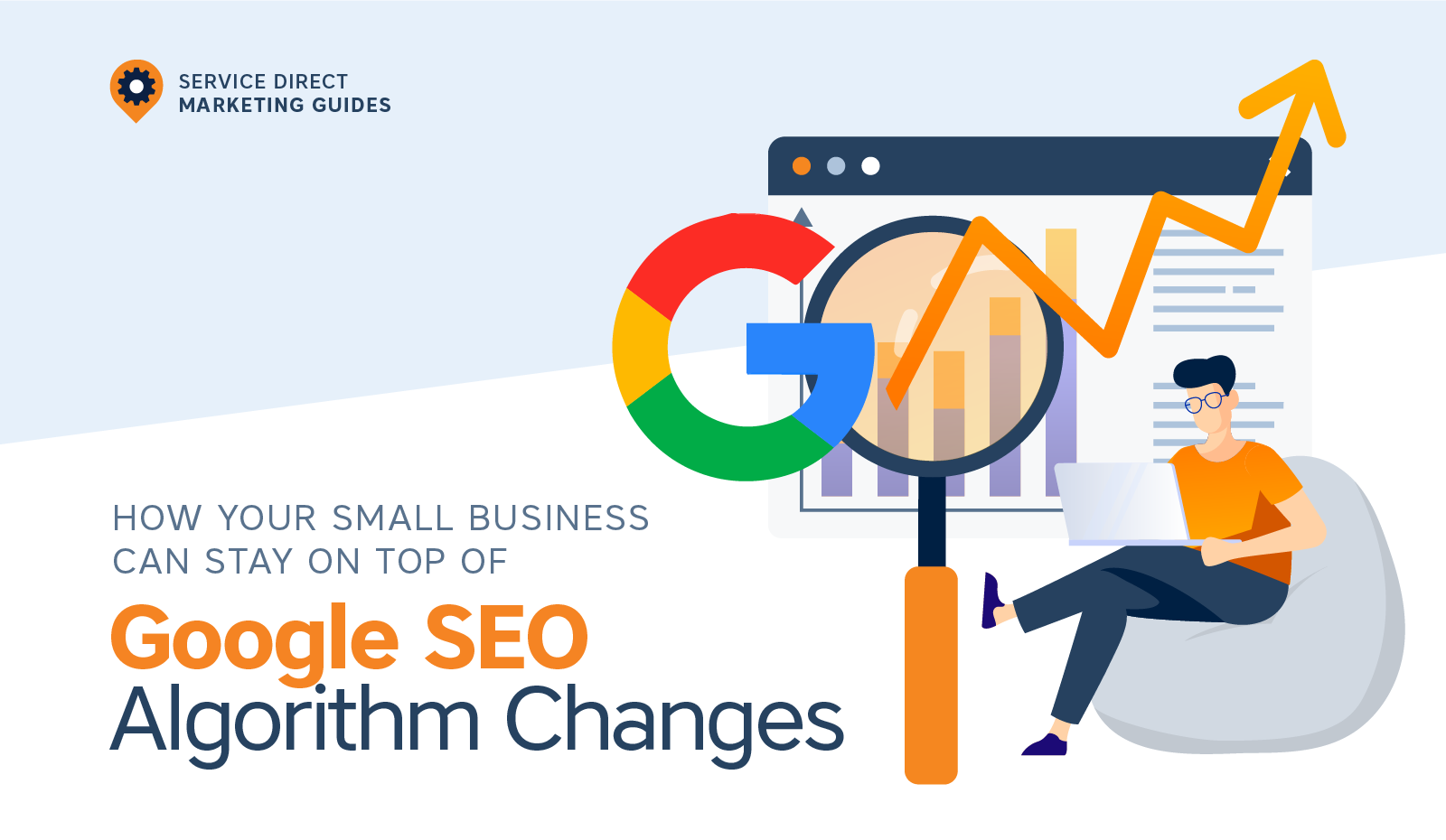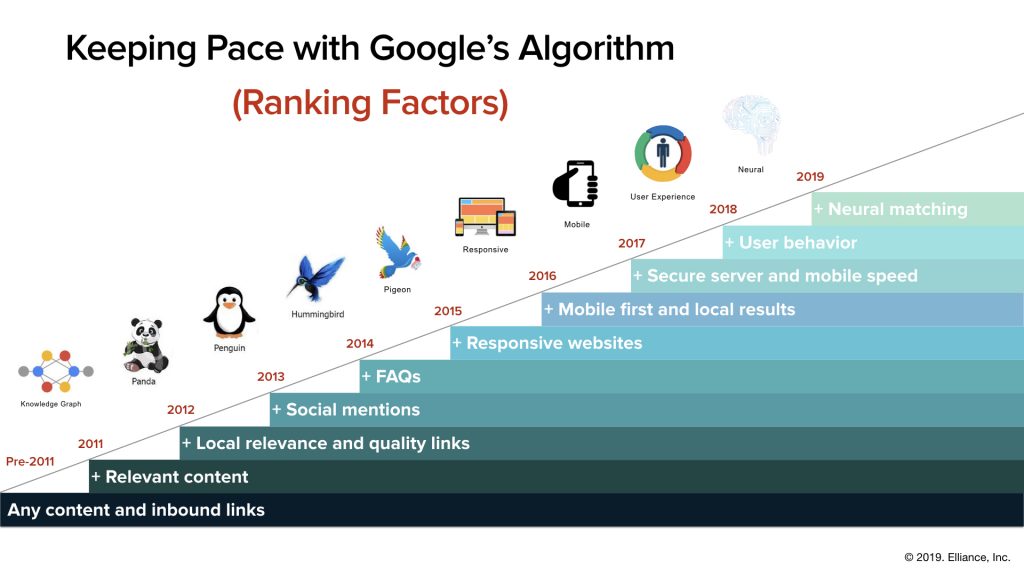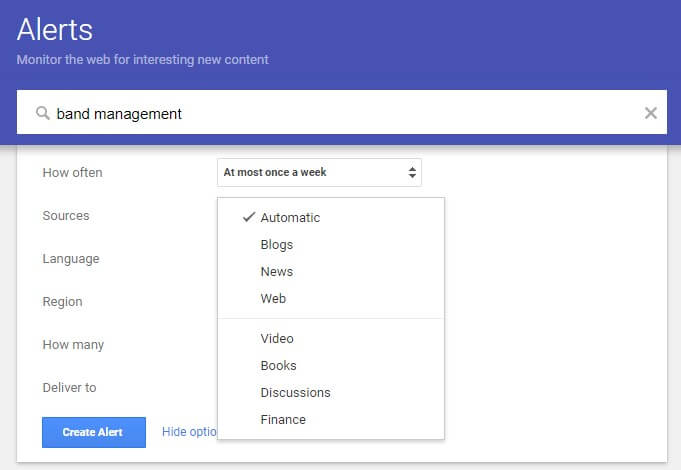How Your Small Business Can Stay on Top of Google Algorithm Changes
Updated on August 13, 2024
Google algorithm changes can be daunting for small business owners. As a business owner, you have enough on your plate without having to worry about the ever-changing Google algorithms. However, it is important to understand these changes and how they can affect your business.
In a recent survey we performed amongst small business marketers, 13% of respondents reported that staying on top of algorithm changes was the biggest challenge they faced when it came to their SEO efforts.
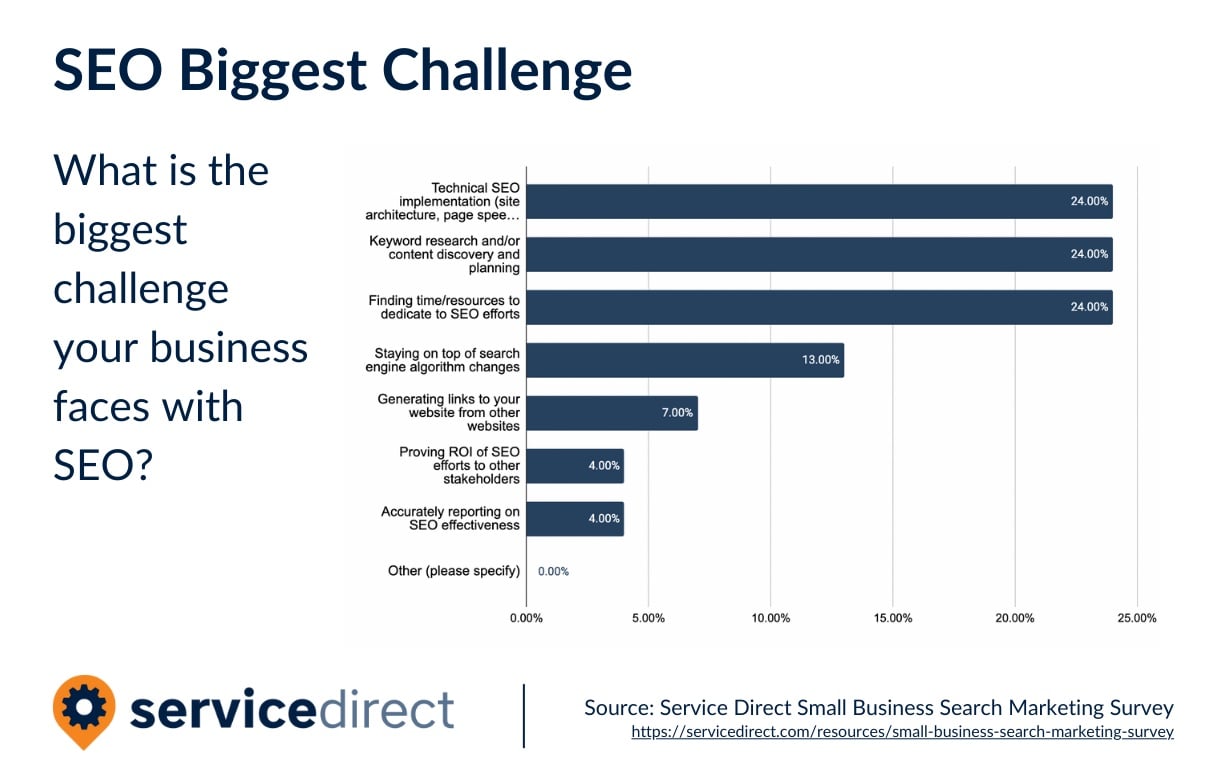
In this article, we will discuss the history of Google algorithm updates and what small business owners need to know in order to stay on top of these changes. We will also provide helpful resources where you can find more information about these updates.
What are Google Algorithm Changes?
Google algorithm changes are updates to Google's search algorithms that are designed to improve the quality of search results. Google makes many small changes to its algorithms every year, but it also occasionally rolls out major algorithmic updates that can have a significant impact on the visibility of websites in Google's search results.
For small business owners, it is important to be aware of Google's algorithm changes and how they may affect their website's visibility. By understanding the definition of Google algorithm changes, small business owners can be better prepared to adapt their SEO strategies in order to maintain or improve their ranking in Google's search results.
How Often Does Google Make Algorithm Changes?
Google makes 500 to 600 algorithm changes each year. While most of these changes are small and go unnoticed by the general public, they can greatly impact small businesses that rely on Google for their website traffic.
That's why it's so important for small business owners to stay up-to-date on the latest algorithm changes and how they might affect their website. Google doesn't always announce when they're making changes to their algorithm, but there are a number of resources that can help business owners stay informed.
By keeping track of Google's algorithm changes, small business owners can ensure that their website is always optimized for the latest search trends.
Examples of Past Major Google Updates
By knowing how Google's algorithms have changed in the past, you can anticipate what changes might be coming in the future and adjust your strategy accordingly. This way, you can ensure that your small business is using the most effective SEO and marketing tactics.
Here are 6 major Google algorithm updates:
Passage Ranking Update (February 2021)
Passage Ranking was a significant update that allowed Google to rank specific passages or sections within a webpage independently of the entire page. This was particularly beneficial for long-form content or articles that covered multiple topics.

Even if a webpage wasn't perfectly optimized for a specific query, Google could still extract and rank a relevant passage that directly addressed the user's search intent.
This update helped improve the visibility of content that provided valuable insights buried within broader articles, encouraging content creators to ensure that every section of their content was useful and well-structured.
Page Experience Update (August 2021)
The Page Experience Update introduced Core Web Vitals as part of Google's ranking criteria. Core Web Vitals are specific metrics related to the speed, responsiveness, and visual stability of a website, including:
- LCP: Measures loading performance.
- FID: Measures interactivity.
- CLS: Measures visual stability.
The update was aimed at encouraging website owners to improve the overall user experience, particularly on mobile devices.
Sites that provided a fast, smooth, and stable browsing experience, with minimal delays and interruptions, were more likely to see positive changes in their rankings. This update highlighted the growing importance of technical SEO and user experience in maintaining strong search rankings.
Product Reviews Update (March 2022)
The March 2022 Product Reviews Update was an enhancement of previous updates aimed at improving the quality of product review content in search results. Google targeted reviews that lacked depth, originality, and genuine insight.
The update favored product reviews that offered in-depth analysis, comparisons, and original photos or videos. It also rewarded content that provided links to multiple sellers to give users more purchase options.
This update was particularly important for affiliate marketers and e-commerce sites, encouraging them to focus on providing comprehensive and valuable product reviews rather than just replicating information found elsewhere.
May 2022 Core Update
Like other core updates, the May 2022 Core Update was broad and affected various industries and types of websites. It continued Google's ongoing efforts to enhance its ability to deliver relevant and high-quality search results.
The update particularly impacted websites that had previously used tactics like keyword stuffing, poor-quality backlinks, or outdated content to rank highly. It rewarded sites that focused on delivering comprehensive, well-researched, and user-friendly content.
Google’s advice following the update emphasized the importance of E-A-T (Expertise, Authoritativeness, Trustworthiness) and ensuring that content is accurate, relevant, and useful.
Helpful Content Update (August, 2022)
A year after the introduction of the Helpful Content system, Google released an update. As a review, the Helpful Content update is the algorithm change that is designed to reward websites that offer helpful, informative content.
This was a welcome change for small business owners who often struggle to compete with larger businesses that can produce more content. However, the update does come with some challenges.
Google has said that it will be difficult to assess whether or not a piece of content is truly helpful, so there is a risk that some sites will be unfairly penalized. Additionally, Google has indicated that this is just one of many factors that it will be using to assess the quality of a website, so small business owners will need to continue to focus on producing high-quality content if they want to rank well in search results.
March 2024 Core Update
The March 2024 Core Update was a significant update that aimed to elevate the quality of search results by prioritizing useful, original content while demoting low-quality or spammy content.
This update was notable for integrating Google's Helpful Content system into the core algorithm, signaling a stronger emphasis on user-oriented content.
Many websites, especially those relying on outdated SEO practices like link manipulation or AI-generated content without substantial value, experienced significant ranking drops or even deindexing.
The update also introduced tighter spam policies targeting practices like scaled content abuse and expired domain exploitation.
Why You Should Track Updates
Google's algorithms are designed to ensure that users get the most relevant and useful results when they search for something. As a result, even a small change can have a big effect on the way your website is ranked.
By tracking Google's algorithm changes, you can quickly adapt your SEO strategy to ensure that your website continues to reach your target audience. In today's competitive market, staying ahead of the curve is essential for success.
Here are six benefits of tracking Google algorithm updates:
1. Stay ahead of the competition
By tracking Google's algorithm changes, you can stay one step ahead of your competitors. If you know about a change before it happens, you can adjust your SEO strategy accordingly and potentially gain a competitive advantage.
2. Monitor your traffic
Google algorithm changes can have a big impact on your website's traffic. By tracking the changes, you can see how your traffic fluctuates in response to them and make necessary adjustments to your website.
3. Improve your ranking
Google's algorithm is always evolving, and each update has the potential to improve your website's ranking. By tracking the updates, you can identify which changes are having the biggest impact on your ranking and optimize your SEO strategy accordingly.
4. Fix any issues
If you notice that your website's traffic or ranking has been impacted by a Google algorithm change, you can use that information to troubleshoot any issues and make sure that your website is compliant with the latest rules.
5. Increase conversions
Tracking Google algorithm changes can be helpful to improve your website so that it ranks higher when Google makes an algorithm change. For example, if you know that Google is going to make a change that will favor websites with more content, you can create more content on your site. This will help you get more traffic from Google, which can lead to more sales and conversions.
6. Improve visibility
Tracking Google algorithm changes can also help identify opportunities for improving visibility. For example, if a new algorithm update favors mobile-friendly sites, tracking the update can help webmasters make sure their site is optimized for mobile devices. As a result, tracking Google algorithm updates can be a useful tool for both search ranking and visibility.
Top Tips to Track Google Algorithm Changes
So now that you understand more about the history of Google updates and why tracking them is so important for your small business, here's how you can stay on top of things!
Use Google Alerts
Google Alerts is a free tool that allows you to stay on top of these changes. Simply create an account and then choose the keywords you want to track. Google will then send you an email notification whenever there is a change to the ranking of your chosen keywords. This can help you to quickly adapt your SEO strategy in response to Google's ever-changing algorithm.
In addition, Google Alerts can also be used to track your competitors. Simply enter their URL into the Alerts dashboard and Google will notify you of any changes to their ranking. This can give you a valuable advantage in the ever-changing world of SEO.
Here’s how to set up Google alerts step-by-step:
-
Go to Google Alerts (www.google.com/alerts) and log in with your Google account.
-
In the "Create an alert about" field, enter the phrase "Google algorithm changes."
-
In the "How often" field, select "As-it-happens."
-
In the "How many" field, select "All results."
-
Click "Create Alert."
Now, every time there is a change to the Google algorithm, you will receive an email notification. This will help you stay on top of any changes and make sure that your SEO strategy is always up-to-date.
Follow Twitter Hashtags and Industry Leaders
One way to stay on top of the latest changes is to use Twitter hashtags. Hashtags allow you to track a specific topic on Twitter, and they can be a great way to stay up-to-date on Google algorithm changes.
To use hashtags effectively, start by following some of the most popular tech blogs and Google news accounts. These accounts often use hashtags to share breaking news stories, and they can help you quickly find information about Google algorithm updates.
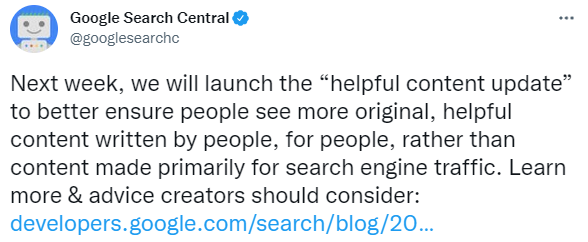
By using hashtags, you can easily find tweets from experts that can help you understand the latest Google algorithm changes and how they might impact your business.
Specific hashtags related to Google algorithms:
- #GoogleUpdate
- #GoogleAlgorithm
- #GoogleNews
- #GoogleChanges
Google experts who frequently post about Google algorithm changes:
- Barry Schwartz: @rustybrick
- John Mueller: @JohnMu
- Danny Sullivan: @dannysullivan
- Glenn Gabe: @glenngabe
- Marie Haynes: @Marie_Haynes
Use Tracking Tools
Tracking tools can help business owners keep tabs on Google's ever-changing landscape and make sure that their website is always compliant.
In today's competitive market, it is essential for businesses to put their best foot forward, and tracking tools can help them do just that.
Here are the top 6 tracking tools to use to stay on top of Google algorithm updates:
ALGOROO
Algoroo is a keyword tracking tool that monitors Google's SERP results in real-time. This means that users can see which keywords are being affected by Google's algorithm changes as they happen.

Secondly, Algoroo also provides users with historical data, so they can see how Google's algorithms have changed over time. This information can be useful for businesses when they're making decisions about their SEO strategies.
As a result, Algoroo is an essential tool for small business owners who want to stay ahead of Google's algorithm changes.
Google Search Central
Google Search Central (formerly known as Google Webmaster Central) is a free Google service that helps small business owners stay up to date with Google algorithm changes. The service sends notifications when Google makes changes to its algorithms, which can help small business owners keep their websites ranking high in search results.
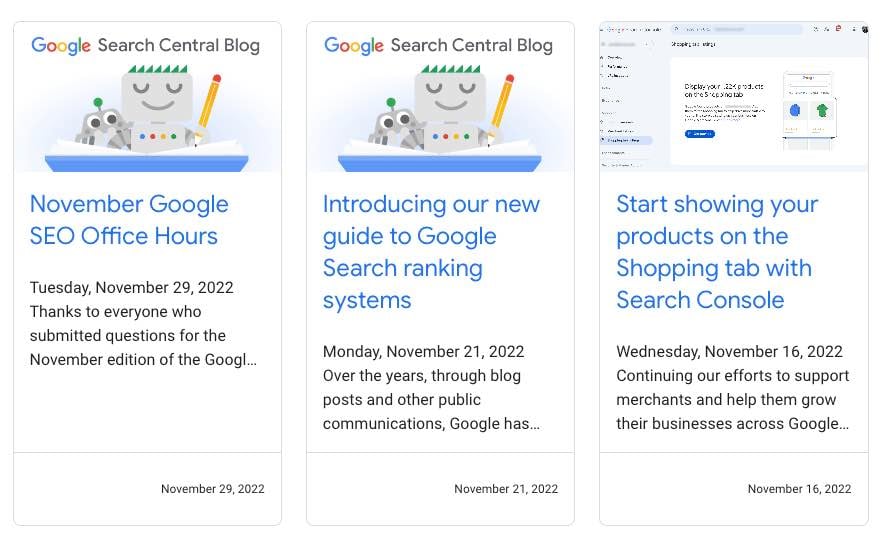
Plus, Google Search Central provides website owners with tools to submit their website to Google for indexing, track their website's search traffic, and receive advice on how to improve their website's visibility in Google search results.
Overall, Google Webmaster Central is a valuable resource for small business owners who want to ensure that their website ranks highly in Google search results.
MozCast
MozCast is another free tracking tool that monitors Google algorithm changes in real-time. The tool uses data from Moz's own web crawler to track changes in SERP features and ranking volatility. MozCast offers a variety of features that can be helpful for small business owners, including:
- A daily "weather report" that shows how volatile the Google algorithm is currently.
- A history of past algorithm changes.
- Customizable alerts that notify you of major algorithm changes.
- An analysis of which SERP features are being impacted by the current algorithm change.
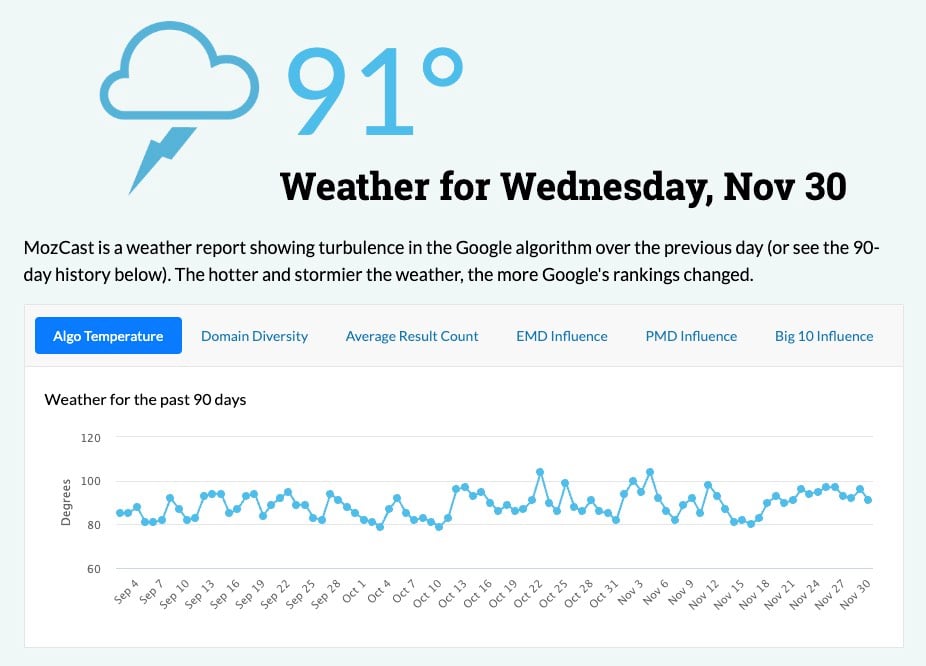
By using MozCast, small business owners can stay up to date on Google algorithm changes and make sure their website is prepared for any potential impacts.
SEMrush Sensor
SEMrush Sensor is a tool that monitors Google's algorithms and notifies users of any changes. This way, you can be the first to know about any changes and adjust your marketing strategy accordingly.
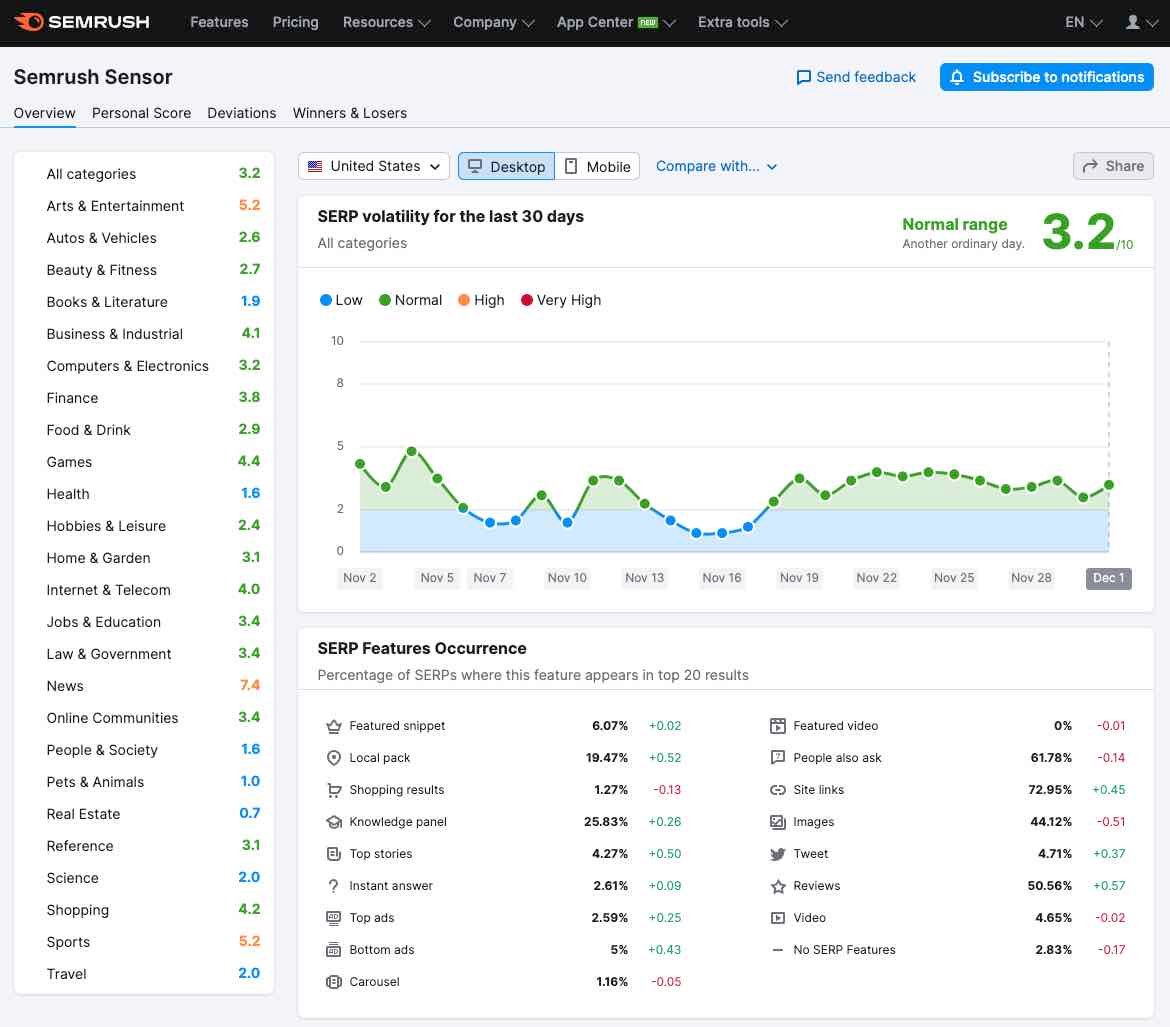
In addition to tracking Google algorithm changes, SEMrush Sensor also provides data on keyword rankings, traffic, and other essential metrics. This wealth of data can be invaluable for small business owners looking to optimize their website and marketing efforts.
CognitiveSEO Signals
CognitiveSEO Signals provides an instant alert whenever there is a change in Google's algorithms, along with detailed analysis of what the change means for your website. This allows you to quickly and easily adjust your SEO strategy to ensure that your website continues to rank highly in Google search results.

CognitiveSEO Signals also offers a number of other benefits, including regular reports on your website's SEO performance and detailed keyword research. If you're serious about getting ahead of your competition online, CognitiveSEO Signals is an essential tool.
Accuranker
Accuranker is a keyword tracking tool that monitors SERP rankings for a given list of keywords. It also tracks Google algorithm changes and provides notifications when these changes occur.
The benefits of using Accuranker include the ability to quickly adapt to Google algorithm changes, as well as the ability to track SERP rankings for multiple keywords simultaneously.
Another benefit is that Accuranker offers a free trial, which makes it an affordable option for small business owners. As a result, it is an essential tool for anyone who wants to stay up to date with Google algorithm changes.
Conclusion
Algorithm changes can be difficult to keep track of, but following the resources we’ve listed will help you stay ahead of the curve. The first step is understanding what algorithm changes are and their history. Then, it’s important to track how these changes will impact your website.
Lastly, use reputable sources to stay up to date on all things algorithm related! It is important to remember that these updates are often geared towards improving user experience, so make sure your website and content are up to par!

